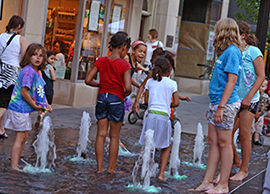When dangerously cold temperatures strike, residents are urged to limit time outdoors for themselves and their pets, as well as to check in on friends and neighbors who may need assistance.
Warming centers
Warming centers are available to residents when triggered by extreme temperatures.
Warming centers are open seven days a week from 6 p.m. – 6 a.m. at West Suburban Medical Center, Erie Street at Austin Boulevard and from 11 a.m. – 8 p.m. at Rush Oak Park Hospital, 520 S. Wisconsin Ave. Should the temperature drop below 32 degrees, Rush Oak Park Hospital will be open 24 hours.
Hours may be extended when weather conditions warrant.
To find out if the center is open after hours, call West Suburban Hospital at 708.763.6747 or Rush Oak Park Hospital at 708.660.6000.
The Oak Park Public Library’s three branches also serve as warming centers.
The Library’s Main Location, 834 Lake St., is open 9 a.m. – 9 p.m. on Mondays – Thursdays, 9 a.m. – 6 p.m. on Fridays, 9 a.m. – 5 p.m. Saturdays, noon- 5 p.m. Sundays.
The Dole Branch, 255 Augusta St., is closed on Mondays, open 10 a.m. – 9 p.m. Tuesdays – Thursdays, 10 a.m. – 6 p.m. Fridays, 10 a.m. – 5 p.m. Sundays.
The Maze Branch, 845 Gunderson Ave. is open 10 a.m. – 9 p.m. Mondays- Thursdays, closed on Fridays, open 10 a.m. – 5 p.m. Saturdays, noon- 5p.m. Sundays.
Masks must be worn at all the warming center locations. If transportation is needed, call the Oak Park Police Department’s non-emergency number 708.386.3800.
Safety tips
When cold weather strikes, officials recommend practicing the following safety tips:
- Limit time outdoors in cold, wet or windy weather. Pay attention to weather forecasts and wind chill readings. In very cold, windy weather, exposed skin can develop frostbite in a matter of minutes.
- Dress in several layers of loose, warm clothing rather than a single layer. Air trapped between the layers of clothing acts as insulation against the cold. Wear windproof and waterproof outer garments to protect against wind, snow and rain. Choose undergarments that wick moisture away from your skin.
- Wear a hat that fully covers your ears. Heavy woolen or windproof materials make the best headwear for cold protection.
- Wear mittens rather than gloves, which provide better protection.
- Watch for signals of frostbite. Early signs include redness, prickling and numbness.
- Plan to protect yourself. When traveling in cold weather, carry emergency supplies and warm clothing in case you become stranded.










